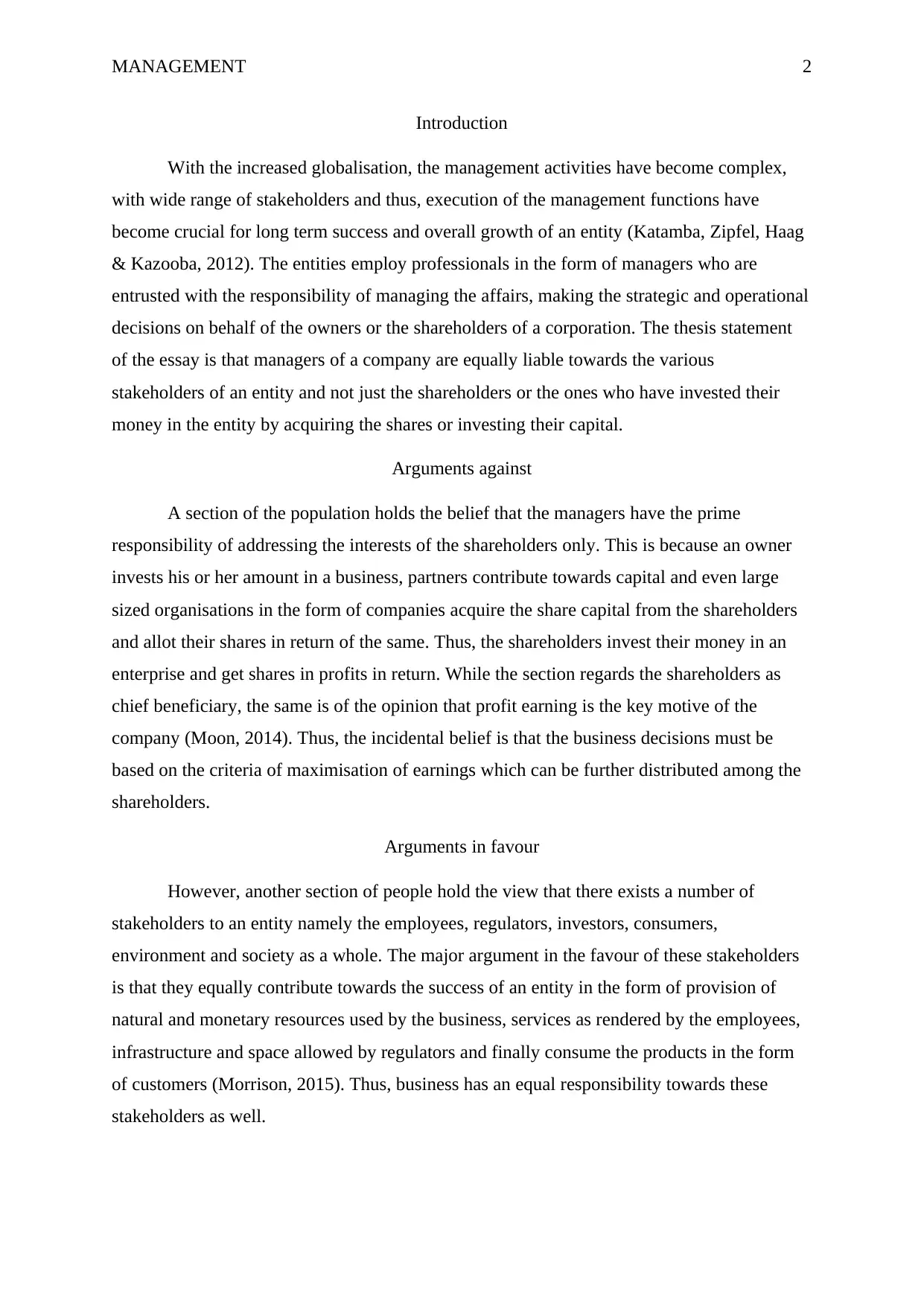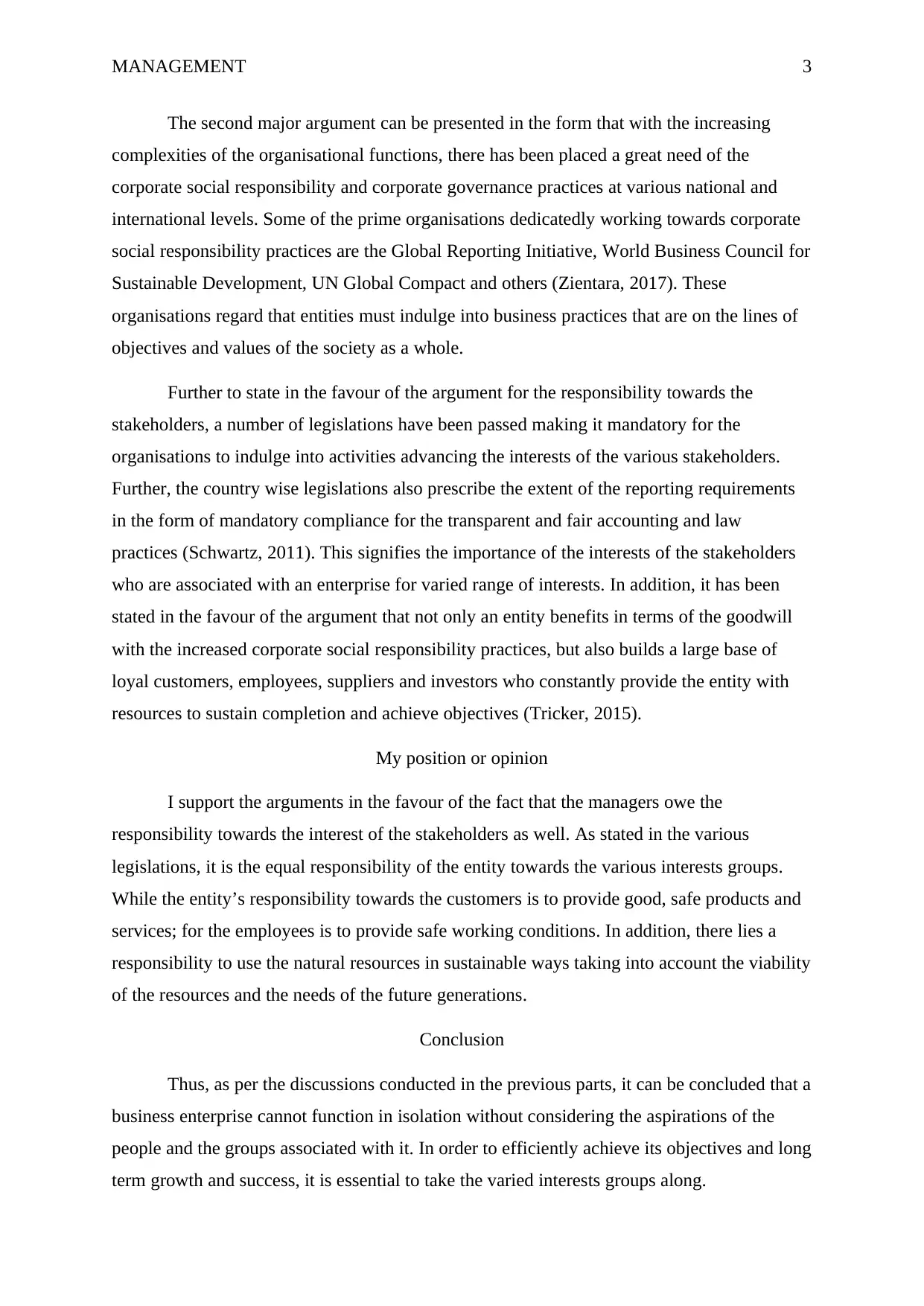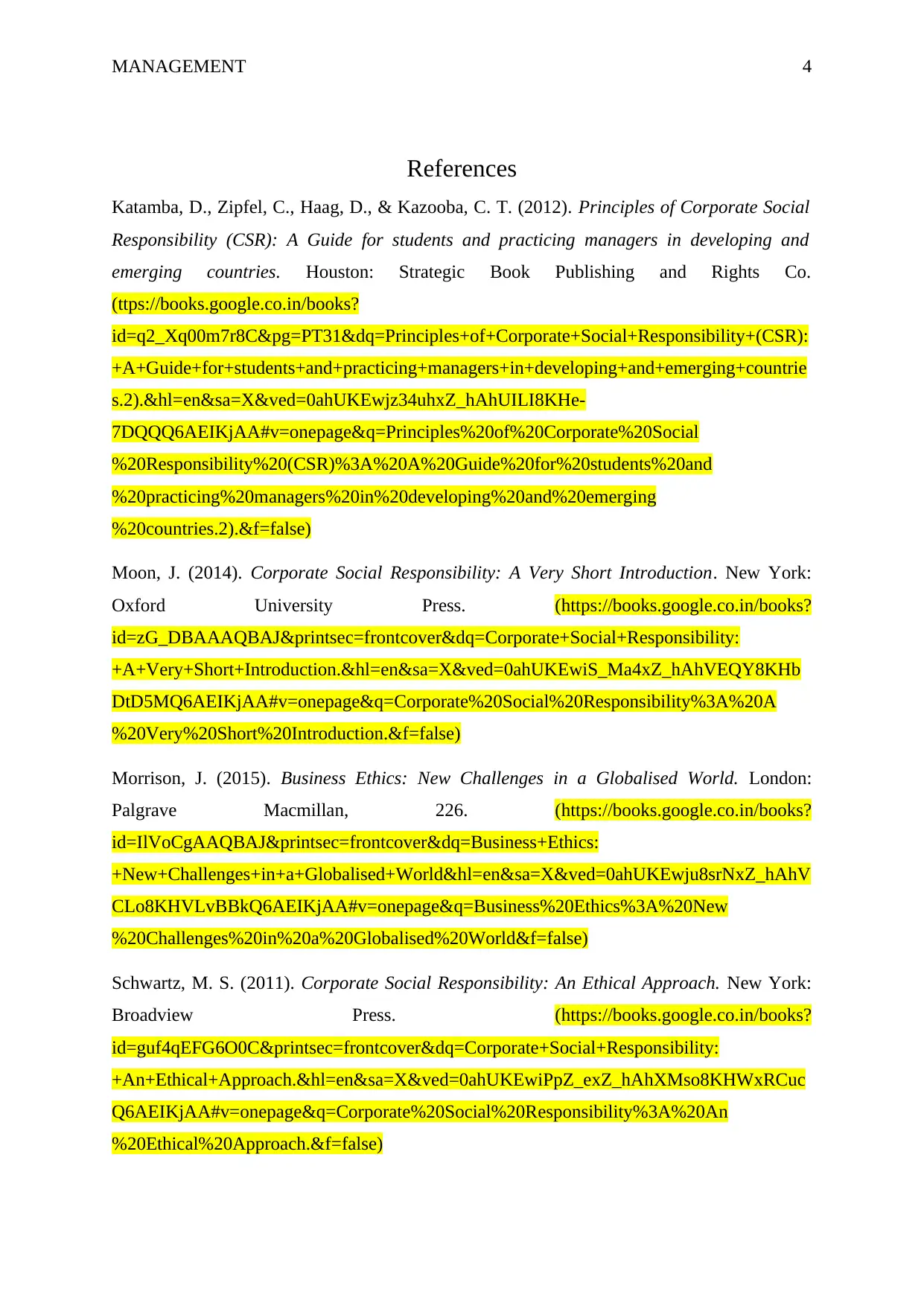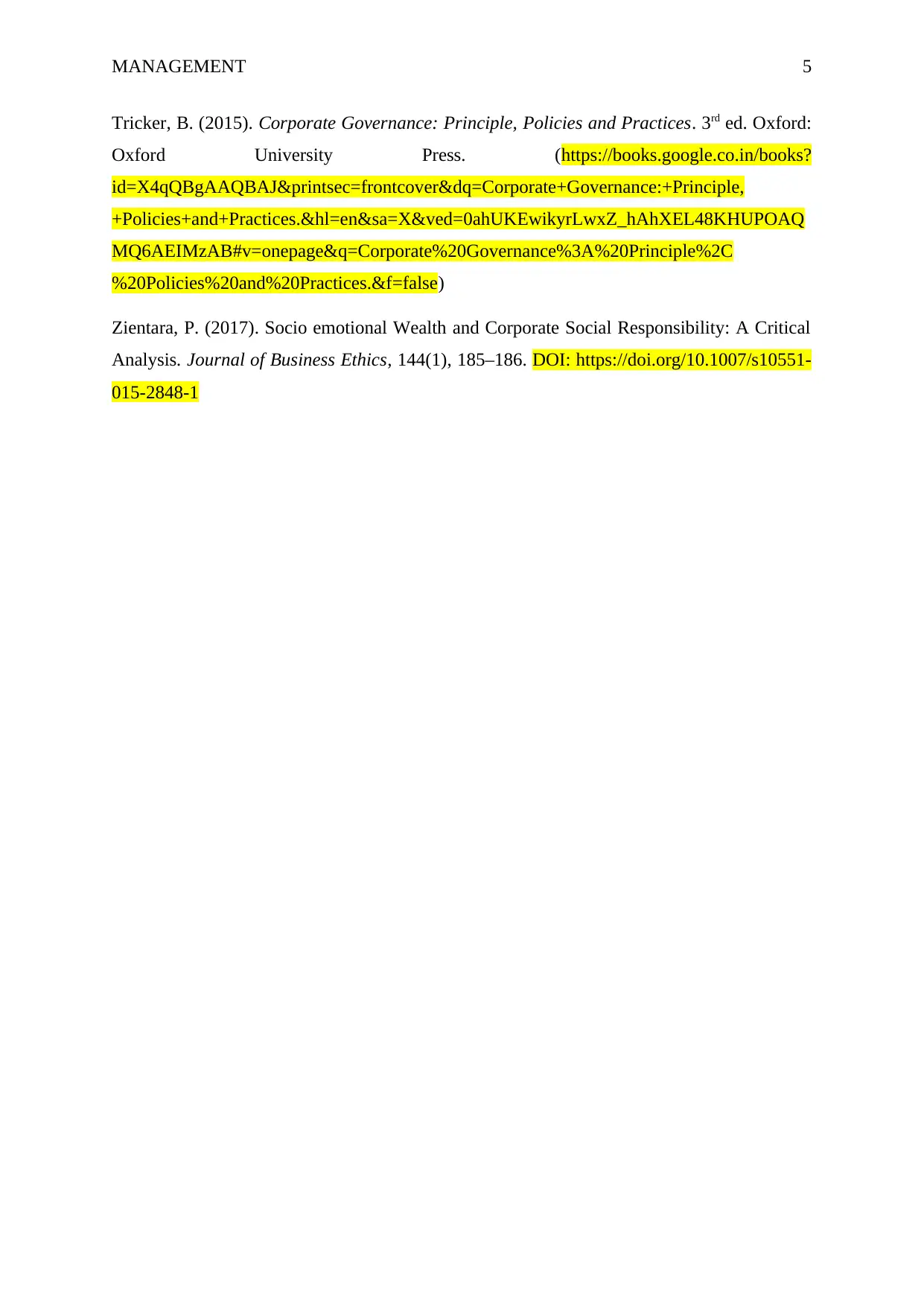Essay on Managerial Responsibilities to Stakeholders and Shareholders
VerifiedAdded on 2023/04/25
|5
|1276
|188
Essay
AI Summary
This essay delves into the critical debate surrounding managerial responsibilities, examining whether managers primarily owe a duty to shareholders or to a broader range of stakeholders. The introduction highlights the increasing complexity of management in a globalized world and emphasizes the importance of effective management for long-term success. The essay presents arguments supporting the view that managers are responsible to shareholders, focusing on profit maximization. Conversely, it provides arguments in favor of considering the interests of various stakeholders, including employees, customers, and society. The essay also highlights the importance of corporate social responsibility and corporate governance practices. The author supports the view that managers have a responsibility towards the interests of all stakeholders, including the environment and future generations. In conclusion, the essay underscores the need for businesses to consider the interests of all stakeholders to achieve long-term success and growth. The essay references several academic sources to support its arguments, providing a comprehensive overview of the topic.

MANAGEMENT 1
MANAGEMENT
MANAGEMENT
Paraphrase This Document
Need a fresh take? Get an instant paraphrase of this document with our AI Paraphraser

MANAGEMENT 2
Introduction
With the increased globalisation, the management activities have become complex,
with wide range of stakeholders and thus, execution of the management functions have
become crucial for long term success and overall growth of an entity (Katamba, Zipfel, Haag
& Kazooba, 2012). The entities employ professionals in the form of managers who are
entrusted with the responsibility of managing the affairs, making the strategic and operational
decisions on behalf of the owners or the shareholders of a corporation. The thesis statement
of the essay is that managers of a company are equally liable towards the various
stakeholders of an entity and not just the shareholders or the ones who have invested their
money in the entity by acquiring the shares or investing their capital.
Arguments against
A section of the population holds the belief that the managers have the prime
responsibility of addressing the interests of the shareholders only. This is because an owner
invests his or her amount in a business, partners contribute towards capital and even large
sized organisations in the form of companies acquire the share capital from the shareholders
and allot their shares in return of the same. Thus, the shareholders invest their money in an
enterprise and get shares in profits in return. While the section regards the shareholders as
chief beneficiary, the same is of the opinion that profit earning is the key motive of the
company (Moon, 2014). Thus, the incidental belief is that the business decisions must be
based on the criteria of maximisation of earnings which can be further distributed among the
shareholders.
Arguments in favour
However, another section of people hold the view that there exists a number of
stakeholders to an entity namely the employees, regulators, investors, consumers,
environment and society as a whole. The major argument in the favour of these stakeholders
is that they equally contribute towards the success of an entity in the form of provision of
natural and monetary resources used by the business, services as rendered by the employees,
infrastructure and space allowed by regulators and finally consume the products in the form
of customers (Morrison, 2015). Thus, business has an equal responsibility towards these
stakeholders as well.
Introduction
With the increased globalisation, the management activities have become complex,
with wide range of stakeholders and thus, execution of the management functions have
become crucial for long term success and overall growth of an entity (Katamba, Zipfel, Haag
& Kazooba, 2012). The entities employ professionals in the form of managers who are
entrusted with the responsibility of managing the affairs, making the strategic and operational
decisions on behalf of the owners or the shareholders of a corporation. The thesis statement
of the essay is that managers of a company are equally liable towards the various
stakeholders of an entity and not just the shareholders or the ones who have invested their
money in the entity by acquiring the shares or investing their capital.
Arguments against
A section of the population holds the belief that the managers have the prime
responsibility of addressing the interests of the shareholders only. This is because an owner
invests his or her amount in a business, partners contribute towards capital and even large
sized organisations in the form of companies acquire the share capital from the shareholders
and allot their shares in return of the same. Thus, the shareholders invest their money in an
enterprise and get shares in profits in return. While the section regards the shareholders as
chief beneficiary, the same is of the opinion that profit earning is the key motive of the
company (Moon, 2014). Thus, the incidental belief is that the business decisions must be
based on the criteria of maximisation of earnings which can be further distributed among the
shareholders.
Arguments in favour
However, another section of people hold the view that there exists a number of
stakeholders to an entity namely the employees, regulators, investors, consumers,
environment and society as a whole. The major argument in the favour of these stakeholders
is that they equally contribute towards the success of an entity in the form of provision of
natural and monetary resources used by the business, services as rendered by the employees,
infrastructure and space allowed by regulators and finally consume the products in the form
of customers (Morrison, 2015). Thus, business has an equal responsibility towards these
stakeholders as well.

MANAGEMENT 3
The second major argument can be presented in the form that with the increasing
complexities of the organisational functions, there has been placed a great need of the
corporate social responsibility and corporate governance practices at various national and
international levels. Some of the prime organisations dedicatedly working towards corporate
social responsibility practices are the Global Reporting Initiative, World Business Council for
Sustainable Development, UN Global Compact and others (Zientara, 2017). These
organisations regard that entities must indulge into business practices that are on the lines of
objectives and values of the society as a whole.
Further to state in the favour of the argument for the responsibility towards the
stakeholders, a number of legislations have been passed making it mandatory for the
organisations to indulge into activities advancing the interests of the various stakeholders.
Further, the country wise legislations also prescribe the extent of the reporting requirements
in the form of mandatory compliance for the transparent and fair accounting and law
practices (Schwartz, 2011). This signifies the importance of the interests of the stakeholders
who are associated with an enterprise for varied range of interests. In addition, it has been
stated in the favour of the argument that not only an entity benefits in terms of the goodwill
with the increased corporate social responsibility practices, but also builds a large base of
loyal customers, employees, suppliers and investors who constantly provide the entity with
resources to sustain completion and achieve objectives (Tricker, 2015).
My position or opinion
I support the arguments in the favour of the fact that the managers owe the
responsibility towards the interest of the stakeholders as well. As stated in the various
legislations, it is the equal responsibility of the entity towards the various interests groups.
While the entity’s responsibility towards the customers is to provide good, safe products and
services; for the employees is to provide safe working conditions. In addition, there lies a
responsibility to use the natural resources in sustainable ways taking into account the viability
of the resources and the needs of the future generations.
Conclusion
Thus, as per the discussions conducted in the previous parts, it can be concluded that a
business enterprise cannot function in isolation without considering the aspirations of the
people and the groups associated with it. In order to efficiently achieve its objectives and long
term growth and success, it is essential to take the varied interests groups along.
The second major argument can be presented in the form that with the increasing
complexities of the organisational functions, there has been placed a great need of the
corporate social responsibility and corporate governance practices at various national and
international levels. Some of the prime organisations dedicatedly working towards corporate
social responsibility practices are the Global Reporting Initiative, World Business Council for
Sustainable Development, UN Global Compact and others (Zientara, 2017). These
organisations regard that entities must indulge into business practices that are on the lines of
objectives and values of the society as a whole.
Further to state in the favour of the argument for the responsibility towards the
stakeholders, a number of legislations have been passed making it mandatory for the
organisations to indulge into activities advancing the interests of the various stakeholders.
Further, the country wise legislations also prescribe the extent of the reporting requirements
in the form of mandatory compliance for the transparent and fair accounting and law
practices (Schwartz, 2011). This signifies the importance of the interests of the stakeholders
who are associated with an enterprise for varied range of interests. In addition, it has been
stated in the favour of the argument that not only an entity benefits in terms of the goodwill
with the increased corporate social responsibility practices, but also builds a large base of
loyal customers, employees, suppliers and investors who constantly provide the entity with
resources to sustain completion and achieve objectives (Tricker, 2015).
My position or opinion
I support the arguments in the favour of the fact that the managers owe the
responsibility towards the interest of the stakeholders as well. As stated in the various
legislations, it is the equal responsibility of the entity towards the various interests groups.
While the entity’s responsibility towards the customers is to provide good, safe products and
services; for the employees is to provide safe working conditions. In addition, there lies a
responsibility to use the natural resources in sustainable ways taking into account the viability
of the resources and the needs of the future generations.
Conclusion
Thus, as per the discussions conducted in the previous parts, it can be concluded that a
business enterprise cannot function in isolation without considering the aspirations of the
people and the groups associated with it. In order to efficiently achieve its objectives and long
term growth and success, it is essential to take the varied interests groups along.
⊘ This is a preview!⊘
Do you want full access?
Subscribe today to unlock all pages.

Trusted by 1+ million students worldwide

MANAGEMENT 4
References
Katamba, D., Zipfel, C., Haag, D., & Kazooba, C. T. (2012). Principles of Corporate Social
Responsibility (CSR): A Guide for students and practicing managers in developing and
emerging countries. Houston: Strategic Book Publishing and Rights Co.
(ttps://books.google.co.in/books?
id=q2_Xq00m7r8C&pg=PT31&dq=Principles+of+Corporate+Social+Responsibility+(CSR):
+A+Guide+for+students+and+practicing+managers+in+developing+and+emerging+countrie
s.2).&hl=en&sa=X&ved=0ahUKEwjz34uhxZ_hAhUILI8KHe-
7DQQQ6AEIKjAA#v=onepage&q=Principles%20of%20Corporate%20Social
%20Responsibility%20(CSR)%3A%20A%20Guide%20for%20students%20and
%20practicing%20managers%20in%20developing%20and%20emerging
%20countries.2).&f=false)
Moon, J. (2014). Corporate Social Responsibility: A Very Short Introduction. New York:
Oxford University Press. (https://books.google.co.in/books?
id=zG_DBAAAQBAJ&printsec=frontcover&dq=Corporate+Social+Responsibility:
+A+Very+Short+Introduction.&hl=en&sa=X&ved=0ahUKEwiS_Ma4xZ_hAhVEQY8KHb
DtD5MQ6AEIKjAA#v=onepage&q=Corporate%20Social%20Responsibility%3A%20A
%20Very%20Short%20Introduction.&f=false)
Morrison, J. (2015). Business Ethics: New Challenges in a Globalised World. London:
Palgrave Macmillan, 226. (https://books.google.co.in/books?
id=IlVoCgAAQBAJ&printsec=frontcover&dq=Business+Ethics:
+New+Challenges+in+a+Globalised+World&hl=en&sa=X&ved=0ahUKEwju8srNxZ_hAhV
CLo8KHVLvBBkQ6AEIKjAA#v=onepage&q=Business%20Ethics%3A%20New
%20Challenges%20in%20a%20Globalised%20World&f=false)
Schwartz, M. S. (2011). Corporate Social Responsibility: An Ethical Approach. New York:
Broadview Press. (https://books.google.co.in/books?
id=guf4qEFG6O0C&printsec=frontcover&dq=Corporate+Social+Responsibility:
+An+Ethical+Approach.&hl=en&sa=X&ved=0ahUKEwiPpZ_exZ_hAhXMso8KHWxRCuc
Q6AEIKjAA#v=onepage&q=Corporate%20Social%20Responsibility%3A%20An
%20Ethical%20Approach.&f=false)
References
Katamba, D., Zipfel, C., Haag, D., & Kazooba, C. T. (2012). Principles of Corporate Social
Responsibility (CSR): A Guide for students and practicing managers in developing and
emerging countries. Houston: Strategic Book Publishing and Rights Co.
(ttps://books.google.co.in/books?
id=q2_Xq00m7r8C&pg=PT31&dq=Principles+of+Corporate+Social+Responsibility+(CSR):
+A+Guide+for+students+and+practicing+managers+in+developing+and+emerging+countrie
s.2).&hl=en&sa=X&ved=0ahUKEwjz34uhxZ_hAhUILI8KHe-
7DQQQ6AEIKjAA#v=onepage&q=Principles%20of%20Corporate%20Social
%20Responsibility%20(CSR)%3A%20A%20Guide%20for%20students%20and
%20practicing%20managers%20in%20developing%20and%20emerging
%20countries.2).&f=false)
Moon, J. (2014). Corporate Social Responsibility: A Very Short Introduction. New York:
Oxford University Press. (https://books.google.co.in/books?
id=zG_DBAAAQBAJ&printsec=frontcover&dq=Corporate+Social+Responsibility:
+A+Very+Short+Introduction.&hl=en&sa=X&ved=0ahUKEwiS_Ma4xZ_hAhVEQY8KHb
DtD5MQ6AEIKjAA#v=onepage&q=Corporate%20Social%20Responsibility%3A%20A
%20Very%20Short%20Introduction.&f=false)
Morrison, J. (2015). Business Ethics: New Challenges in a Globalised World. London:
Palgrave Macmillan, 226. (https://books.google.co.in/books?
id=IlVoCgAAQBAJ&printsec=frontcover&dq=Business+Ethics:
+New+Challenges+in+a+Globalised+World&hl=en&sa=X&ved=0ahUKEwju8srNxZ_hAhV
CLo8KHVLvBBkQ6AEIKjAA#v=onepage&q=Business%20Ethics%3A%20New
%20Challenges%20in%20a%20Globalised%20World&f=false)
Schwartz, M. S. (2011). Corporate Social Responsibility: An Ethical Approach. New York:
Broadview Press. (https://books.google.co.in/books?
id=guf4qEFG6O0C&printsec=frontcover&dq=Corporate+Social+Responsibility:
+An+Ethical+Approach.&hl=en&sa=X&ved=0ahUKEwiPpZ_exZ_hAhXMso8KHWxRCuc
Q6AEIKjAA#v=onepage&q=Corporate%20Social%20Responsibility%3A%20An
%20Ethical%20Approach.&f=false)
Paraphrase This Document
Need a fresh take? Get an instant paraphrase of this document with our AI Paraphraser

MANAGEMENT 5
Tricker, B. (2015). Corporate Governance: Principle, Policies and Practices. 3rd ed. Oxford:
Oxford University Press. (https://books.google.co.in/books?
id=X4qQBgAAQBAJ&printsec=frontcover&dq=Corporate+Governance:+Principle,
+Policies+and+Practices.&hl=en&sa=X&ved=0ahUKEwikyrLwxZ_hAhXEL48KHUPOAQ
MQ6AEIMzAB#v=onepage&q=Corporate%20Governance%3A%20Principle%2C
%20Policies%20and%20Practices.&f=false)
Zientara, P. (2017). Socio emotional Wealth and Corporate Social Responsibility: A Critical
Analysis. Journal of Business Ethics, 144(1), 185–186. DOI: https://doi.org/10.1007/s10551-
015-2848-1
Tricker, B. (2015). Corporate Governance: Principle, Policies and Practices. 3rd ed. Oxford:
Oxford University Press. (https://books.google.co.in/books?
id=X4qQBgAAQBAJ&printsec=frontcover&dq=Corporate+Governance:+Principle,
+Policies+and+Practices.&hl=en&sa=X&ved=0ahUKEwikyrLwxZ_hAhXEL48KHUPOAQ
MQ6AEIMzAB#v=onepage&q=Corporate%20Governance%3A%20Principle%2C
%20Policies%20and%20Practices.&f=false)
Zientara, P. (2017). Socio emotional Wealth and Corporate Social Responsibility: A Critical
Analysis. Journal of Business Ethics, 144(1), 185–186. DOI: https://doi.org/10.1007/s10551-
015-2848-1
1 out of 5
Related Documents
Your All-in-One AI-Powered Toolkit for Academic Success.
+13062052269
info@desklib.com
Available 24*7 on WhatsApp / Email
![[object Object]](/_next/static/media/star-bottom.7253800d.svg)
Unlock your academic potential
Copyright © 2020–2026 A2Z Services. All Rights Reserved. Developed and managed by ZUCOL.




